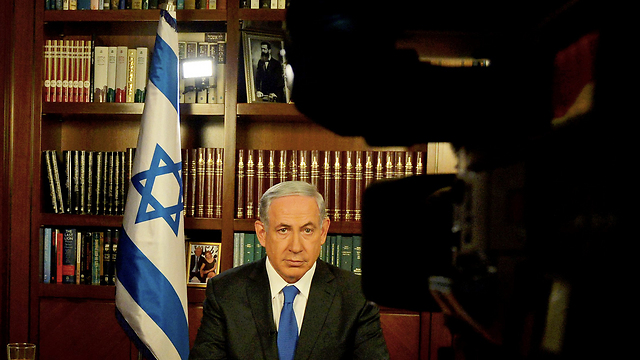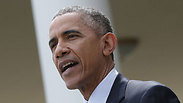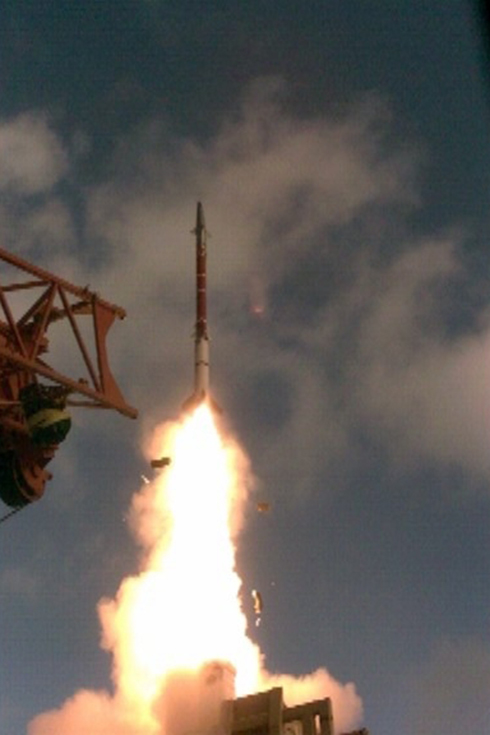President Obama is now willing to promise Israel the moon and the stars, provided that Congress, under the influence of Benjamin Netanyahu, does not spoil his "deal" with Iran. The framework agreement is not yet final, but is supposed to be the crowning glory - and in fact almost the only legacy - of Obama's foreign policy, and he will do anything to remove the obstacles in his path.
Therefore, it is time for Israel to undergo intensive dialogue with the United States, to use the nuclear deal with Iran as leverage to bump its own national security several rungs up the ladder, and in particular to neutralize the dangerous aspects of the agreement between the world powers and Iran. And there are quite a few.

But to achieve this, Netanyahu has to engage in aggressive diplomacy behind the scenes, with the purpose of resuming dialogue with the United States and in an effort to coordinate positions and actions in three main areas:
1. Improvements and adjustments to the final agreement with Iran, which is set to be signed at the end of June. More importantly, understandings on what will happen once the agreement is signed, and is - or isn't - implemented.
2. Intelligence cooperation and security between Israel and the United States, including all the requests that Israel has made and so far has not been granted, or granted sparingly.
3. A commitment from the US to provide Israel with a political umbrella at the UN and in the international arena in general, given the political attack by Mahmoud Abbas that is already in full swing.
Regarding the agreement being drafted with Iran, Israel can demand - and receive - the most important benefit: Coordination on the actions that the US and Israel will take should Iran violate the terms of the agreement. It is important to remember that Iran will remain in possession of an extensive infrastructure for the development and manufacture of nuclear weapons within at least a year.
Iran can actually decide at any time to use this infrastructure. Therefore Israel and the US must be ready to act should Iran be seen to be violating the agreement, and be able to stop it whether through draconian sanctions or military attack, or both. In addition, Israel must receive a commitment from the United States that it will do everything in its power to prevent the military nuclearization of other Middle Eastern countries such as Saudi Arabia, Turkey and Egypt.
Understandings and summaries between the Israeli and American governments on this issue are also a means of deterrent and an effective way of filling in the many gaps in the emerging agreement.
Even if these understandings are secret, they have great value. If, for example, the United States agrees in advance with Israel on joint intelligence estimates and joint diagnosis of violations of the agreement by Iran, and if the United States promises Israel that it will not oppose military action on its part if Iran makes a break for the bomb - the State of Israel will have some security and a safety net in light of the nuclear deal being formulated with Iran.
This will primarily avoid fights and disputes between Israel and the United States, on whether there Iran was in violation or not. In addition, the understanding between Israel and the United States could lead to improvements in the agreement that will be signed in three months time.
But there is one thing Israel cannot accept, and that is Obama's offer to defend it if attacked. This is a risky proposition that could let the Americans force Israel into a move or political line that puts it at risk.
For example, if the US requires Israel to withdraw from the water line in the Jordan Valley. The Americans could then argue that it is possible because Israel has such a defense treaty with the US. This is dangerous, whether it is a regular defense treaty, or an informal alliance. In general, Israel should adhere to the stance set by David Ben-Gurion that Israel defends itself by itself, and does not become the client state of a foreign patron.
The topic for bilateral dialogue is the security package Israel would receive to protect it from the dangers posed by the nuclear agreement. First and foremost, the preservation of the coordination and intelligence cooperation currently carried out between the IDF and the Pentagon, but also enhancing and improving cooperation in cyberspace – both on intelligence gathering and cyber attacks.
Another important component of the security package is American aid in accelerating the development of active defense operations. This includes funds for the David's Sling missile defense system - which would to a large extent counter the threat of Hezbollah's rockets and Iran's cruise missiles - and extra batteries for the Iron Dome.
But most importantly of all, the procurement of thousands of interceptors for all of Israel's air defense systems, so that it can withstand barrages of dozens or even hundreds of missiles, launched simultaneously by Hezbollah and Hamas into Israel. Interceptors are extremely expensive, costing billions of dollars. Israel would go bankrupt if it had to meet the cost alone, and US assistance on this matter is essential to the country's survival.
One must accept the fact that with the emerging agreement or without it, Iran is now a nuclear threshold power. It has the ability to develop and produce nuclear weapons at any time, if it decides to violate the agreement. Therefore, Israel will be in need of offensive capabilities for a preemptive strike on Iran, or for a second strike, if Iran attacks first. For this, Israel needs precision-guided munitions of all kinds, and perhaps another squadron of F-35 stealth fighter jets.
In the political sphere, Israel needs to secure a commitment from the US to veto any Security Council proposal, be it Palestinian or French, that seeks to bypass the need for the Palestinians to reach an agreement with Israel through direct negotiations – an agreement that would require compromises on the part of the Palestinians, too, and thwart the Palestinians' intentions to get the international community to pull their chestnuts out of the fire. Behind-the-scenes pressure from the United States will also be beneficial vis-à-vis other international entities, such as the International Criminal Court in The Hague.
Netanyahu can now get every item on this list from the American government. More precisely, he can get them for as long as the negotiations continue between the world powers and Iran on the final version of the agreement. This is an unprecedented opportunity, a high point, a three-month window to upgrade Israel's political and security coordination with the United States.
But to do so, Netanyahu should immediately halt the hysterical rhetoric, and begin secret and intense negotiations with Israel's most important ally. He should do so now, for the window of opportunity will only be open for as long as the US administration needs Israel's stamp of approval.


















